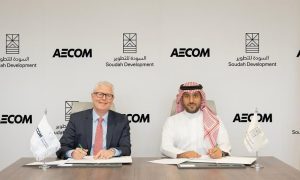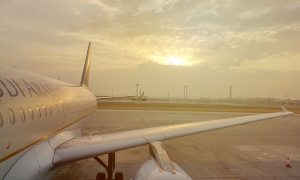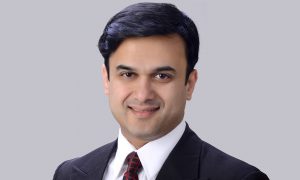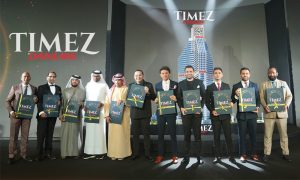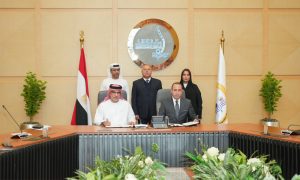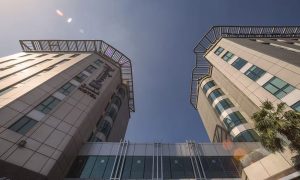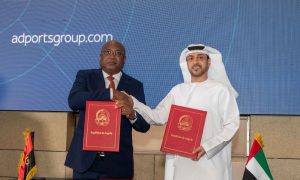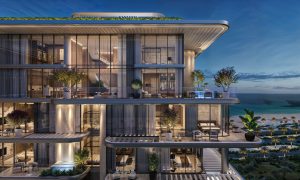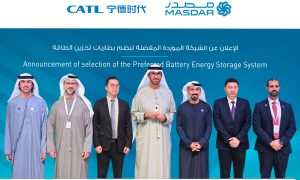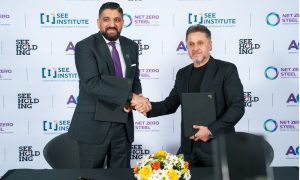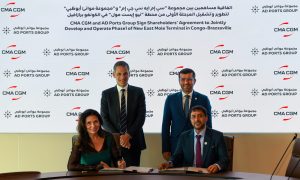In profile: Hamed Zaghw, Mideast chief executive at AECOM
Executive talks about adapting to life in a challenging economic environment, and why he’s optimistic about where his firm is headed

For any company, no matter how well structured or organised, the period just after the handover of leadership is usually a tricky one. There’s inevitably an element of uncertainty and confusion that surrounds any new executive as staff and colleagues attempt to understand the way they work and operate.
Clearly, this was on the mind of David Barwell and Hamed Zaghw when they joined forces in 2014 as Zaghw came on board as chief operating officer, Middle East for AECOM. Back then Barwell was the chief executive of the global consultancy’s regional operations, and as Zaghw puts it, they began working together from the start to ensure that the firm continued to flourish.
With Barwell stepping down from his position, the onus is now on Zaghw to build on the work he’s done, and to continue with the plans they put in place when he first joined.
“I’ve been with AECOM for more than two years now,” says Zaghw, speaking to ME Consultant in an exclusive first interview following his recent appointment as chief executive, Middle East for AECOM.
“I became the COO and it’s been a tremendous journey that has been very exciting. My background was in horizontal construction and design engineering, whereas at AECOM, we do everything. So to me, it was exciting to get into the vertical space and understand what we had to offer and present it to the market. It’s been a very rewarding experience.
“David Barwell was AECOM’s chief executive since 2009. He and I worked very closely together for the last couple of years, and we complemented each other in many ways. Over the last six months leading up to the handover, we embarked on a transition of the organisation. We pretty much reorganised how the business is structured – from a country or geography-based business to an end-market organisation that breaks the barrier between countries and turns the focus onto what each end-market has to offer our clients, regardless of the country they’re sitting in.
“This change or restructuring is just about complete now. We’ve reshaped the organisation in the way we wanted, so as to be best positioned to lead our growth and capture an even better share of our market, going forwards. It’s been a work in progress for some time.”
With a background in civil engineering, Hamed Zaghw moved from Egypt in the 1980s to the US, where he completed his graduate studies. Specialising in bridges, he moved around the US, working on a variety of projects, until the early 1990s, when he decided to return to the Middle East.
Settling in Abu Dhabi for the first five years of his tenure in the UAE, Zaghw came to Dubai in 1995, which is where he’s remained since.
“Dubai was a very promising place at the time. There were lots of plans and talks, but when I came it was still a fairly small, sleepy town. It’s been a tremendous journey to see it become what it is today. The first phase 9 [of growth] was UAE-focused, but when we got to the year 2000, everybody in the industry started looking at expanding. Big companies started looking at places like Bahrain and Qatar, new markets that were at the time really emerging markets. So that’s when I began to branch out into operations in Saudi Arabia, Qatar and so on.”
That wealth of experience is set to come in handy, given the way the 2017 regional construction market is unfolding. With the slump in oil prices clearly having an impact on budgets and payments, there has been a slowdown across the board.
However, Zaghw points out that while there have been cash flow problems and a slowness in payments, this is hardly unique to AECOM. He asserts that the key to thriving in this environment is to manage your organisation’s requirements, in line with market conditions.
“I would venture to say that here in AECOM, we managed that very well in FY16. Our performance in 2016 has been tremendously good. We have been able to manage our projects and the market. From the little that has come out, I think we’ve been able to maintain our market share, while we have seen some growth in certain areas. However, there’s no denying that we’ve seen a downturn in the market.
“Perhaps the most important thing that we’ve been able to achieve [in 2016] is the stabilising of our business in Saudi Arabia. FY15 was a challenging year for us in the Kingdom, but we rode it out and now work better internally and externally with our clients. The current downturn market has really required us to be able to respond to the cost pressures that clients have been facing,” he outlines.
While clients have been cutting budgets, they still want to deliver their projects. This put AECOM in an unfamiliar position, and the consultancy had to be agile and responsive in the face of new market realities, while also continuing to be a partner to clients, working with them to enable them to achieve their objectives.
The firm was helped in this regard by the completion of its integration with the URS Corporation, which they acquired in late 2014. While the acquisition did not have as much of an impact on operations in the Middle East as it did with the US business, the company did have a significant presence in the Middle East, Zaghw explains.
“We had to integrate people and processes to make sure that they operate seamlessly with the rest of the organisation. This addition has been very positive and very complementary to what we traditionally have to offer.”
Returning to the firm’s challenges in Saudi Arabia, Zaghw says AECOM is engaged in a number of large programmes in the Kingdom, and asserts that the key to success is a realistic understanding of the projects and the risks associated with them, and managing them accordingly.
“I think the biggest pitfall people fall in is going in with unrealistic expectations, or taking their business model and trying to impose it on another location. Each place has its own peculiarities, its own special requirements. You need to understand these and work to that system, try to figure it out and work with it to achieve your objectives.
“When you hear people express their frustrations – not necessarily just in Saudi Arabia, but in other markets as well – it’s where they go in and expect that they’re going to get things done the same way that they do in their home country. To me, that’s unrealistic. It shows a lack of understanding of the market conditions in the countries they’re operating in,” he states bluntly.
“The first thing that anybody should do is research how business is conducted in a particular location, before they engage it without full knowledge.”
This is clearly a topic that Zaghw has given a lot of thought to, and he’s keen to stress the importance of understanding the market, pointedly mentioning that in a competitive and cost-driven environment, consultants, contractors and subcontractors all have to make sure they know what they are offering and how it can be delivered, and – crucially – at what price.
“The client always wants to get the most of what they have to pay out for, the service and goods that they’re acquiring. In an economic climate like the one we’re in now, that’s a reality. So we need to make sure that when we’re taking on new work, that we’re aware of all of that, and that we’ve priced it in [the right] way. We may not have the same margins that may have been possible in different conditions, but one has to price to deliver, not price just to get work and then have problems down the road. You have to be able to deliver,” he repeats firmly.
Turning the conversation back to AECOM, Zaghw says the firm is approaching 2017 with a strong sense of realism, and will be pushing forwards with projects and opportunities that offer the promise of stability. He adds that the work he and AECOM’s senior management have done has positioned it to take advantage of the bigger opportunities available in certain markets – ones that are still in the gestation period, or haven’t fully matured yet.
“Our plan for 2017 is one that reflects on these conditions. We’re focusing on the parts of the market that we think are real, and that are going to materialise and promise stable operations for the next year. There are certain basic needs. Being in the infrastructure business – in the broader sense, you’re talking about roads, transportation systems, housing and so on, all of them fall under the infrastructure definition – there are parts of this broad market that have very real needs and demands that governments have to address. Those are the sectors of the market that we have to be ready to engage with and try to capitalise on.”
Zaghw identifies the housing market in Saudi Arabia as one such key opportunity, while Kuwait’s emerging market for housing and related services is another market they’re looking at.
“The restructuring of government services’ delivery approach in Saudi Arabia presents opportunities for us. We would like to be a part of that transition, and we would like to be a partner to as many clients there as we can, to help and serve them in being able to achieve that vision.
“In the UAE, there are the obvious projects in Dubai, where they have the Expo-related activities. Those are very real. It varies from one place to another across the GCC, and you just have to look at each market and see what is real and focus on that.”
Having recently achieved the major milestone of opening the Hamad Port in Doha, Zaghw says this mega project is an example of the type of project AECOM will be focusing on in the coming months and years. A number of large-scale infrastructure related projects are also in the consultancy’s pipeline, with plenty scheduled to be delivered in the near future.
“We’re working with ASHGAL, the Public Works Authority, on delivering the Orbital Highway. We’re looking to deliver the first part of that early next year. That’s going to be another important milestone. In the UAE, the opening of the Abu Dhabi-Dubai extension of the Mohammed Bin Zayed Road is another big, important project. Midfield Terminal is another iconic project we’re working on.
“There have been challenges, and there has been a lot of value engineering that has taken place on some of these projects, where we’ve had to take out part of the scope that may not be immediately required or that can be phased in over a longer period, so as to manage the cash flow on these projects. We work with our clients to allow that to happen. That’s part of our role.
“We’ve also seen movement in the commercial side. You have clients that are still investing and building malls and other commercial facilities, and there are a lot of activities that are happening in the commercial space that we’re very much a part of,” he says.
The uncertain financial times also mean interest in alternative financing has never been higher in the GCC. Zaghw is firm in his belief that this will come to pass in the region, but is equally keen to temper the enthusiasm, saying that alternative financing models are still in their infancy and will take time to really take off in the regional construction market.
“I think it’s going to happen, but it’s one of those things that takes time – to have that legal framework in place, to have the maturity of the market, to be able to take part in the delivery and in the various jurisdictions of the GCC countries. You’ll actually see that there are certain markets or sectors where projects are already being delivered that way, but it’s not a common platform for delivery across the board. It’s going to take a while. Give it two or three years to actually start bearing fruit. But, yes, we are very much interested in it, and we’re engaged – internally and externally – in developing opportunities along these lines.”
Finally, talk turns to the future of AECOM. Much as he worked closely with former chief executive David Barwell, Hamed Zaghw is keen to ensure that AECOM lays the groundwork in terms of continuing to attract the best and brightest in engineering, technology and construction.
“I’m a firm believer that the best part of our workforce is the youngest and brightest. They are the ones who have the energy and new ideas, they want to learn and get the experience, and given the opportunity, they can do wonderful things.
“Our proposition to graduates is that we offer a career in consulting and engineering, with the opportunity to learn and grow and to get exposed to leading-edge knowledge with a particular field. I think that is what we’d like graduates to be coming to work for us for,” he enthuses.
“In fact, we have a programme at AECOM which we call Reverse Mentoring. We have young employees, mostly graduates, that are actually mentoring us [senior staff]. I actually had my first mentoring session recently, and one of the things I picked up on from my ‘mentor’ was the interest and eagerness to be part of the management side – the managing of projects, and highly valuing the role of project managers and so on. My response to that was: do not underestimate the value of the technical competence and ability that you can bring.
“Typically, when you first start out in this career, that is all you can offer. It’s not the management experience, because you don’t have that yet. It’s about being a competent graduate, engineer or scientist, whatever the field you’re in, and doing that very well. My advice would be to do the best job that you can, in whatever area you’re in, and just put your heart and soul into it. You will advance. There is no substitute for hard work, and doing that allows people to progress,” he insists, pointing to his own history as proof that it works.
“If you can continue to round your education, round your experience and expose yourself to different parts of the business that you’re involved in. I’ve personally worked in just about every area of the transportation industry, and it’s not because I had to, it’s because I wanted to. I think that’s been a tremendous asset for me down the line,” he concludes.
